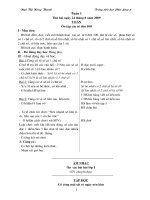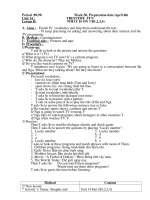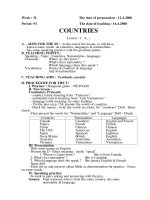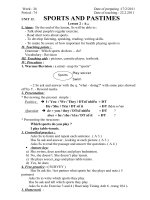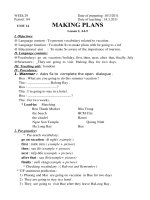Giao an 11cb(tiet49-53)
Bạn đang xem bản rút gọn của tài liệu. Xem và tải ngay bản đầy đủ của tài liệu tại đây (129.6 KB, 9 trang )
LESSON PLANS OF GRADE 11
Date: November 11
th
, 2008.
Period 49.
UNIT 8 : CELEBRATIONS
Lesson 3 : Listening
I. Objectives:
By the end of the lesson, students will be able to listen and pick up specific details.
II. Teaching aids:
Textbook, chalks, boards, cassette player,…
III. Procedure:
1. Checking students’ attendance.
2. Checking ss’ speaking in previous lesson.
3. New lesson: Unit 8_ Listening.
Stages / timing Teacher’s activities Students’ activities
Pre-listening
(10’)
While-listening
(25’)
_ Introduce the topic of the lesson. And then
lead-in the situation of the dialogue about the
New year in Japan.
_ Ask ss to listen and repeat the words (p.95).
And then explain some difficult words:
+ longevity (n) = long life: sự sống lâu
+ constancy (n) sự kiên định
+ pine tree (n) cây thông
+ shrine (n) đền thờ
+ represent (n) người đại diện
_ Ask ss to work in pairs to guess the activities
that the Japanese often do on the New Year’s
Days (p.94).
_ Check ss’ information, then ask ss to listen to
the dialogue and get information for the task.
TASK 1.
_ Let ss listen to the dialogue in three times to
check and put a tick on the statements from the
task.
_ Have ss share their answers together, then ask
them for the information.
_ Check ss’ answers and give feedback.
Answer keys:
1, 2, 3, 4, 6, 8, 10, 11.
TASK 2.
_ Explain how to do the task.
_ Ask ss to listen to the conversation again and
answer the questions.
_ Let ss listen in three times.
_ Ask them to share their answers together.
_ Check their answers, and give feedback.
Suggested answers:
1. Because they want to get rid of the dirt of the
old year and welcome to the New Year.
_ Listen and take notes.
_ Listen and repeat the word.
_ Learn the new words.
_ Work in pairs to discuss and guess
for the japanese’s activities on The
New Year’s Days.
_ Listen to the conversation.
_ Discuss and share the answers with
partner.
_ Give out the answers after listening.
_ Get corrections.
_ Take notes. Then listen to the
dialogue again.
_ Discuss with partners after listening.
_ Give out the answers ( one by one ).
_ Copy down the true answers on
notebook.
Presented by Khưu Chí Thành Thoi Quan High School
LESSON PLANS OF GRADE 11
Post-listening
(8’)
Homework.
(2’)
2. From TV or Radio.
3. Kimonos or special dress.
4. No, New Year’s Day is mostly celebrated
among family only.
_ Ask ss to compare the following aspects of the
Vietnamese New Year with the Japanese one.
+ preparation + food and clothes
+ activities + people to celebrate with
_ Check ss’ information. And give feedback.
_ Write a short paragraph about the Japanese
New Year, following the lesson.
_ Discuss in pairs.
_ Talk about the comparation from the
two countries in front of the class.
Presented by Khưu Chí Thành Thoi Quan High School
THE TAPESCRIPT OF UNIT 8_LISTENING
Lan: You lived in Japan for more than two years, could you tell me something about Japanese
New Year, Mai? When is the New Year observed?
Mai: It’s on 1
st
January, and it lasts three days through 3
rd
January.
Lan: Do people do the same things as we do in Viet Nam?
Mai: Well, there are some simillarities and also some differences.
Lan: Please, tell me about them.
Mai: The preparations begin a few days before the New Year when housewives start cooking
special food for New Year’s Day.
Lan: Do they clean and decorate their houses?
Mai: Sure. They do. On the New Year’s Eve every household do a big cleaning up. The idea is to
get rid of the dirt of the past year and welcome the new one.
Lan: Do they decorate their houses with trees and flowers?
Mai: Yes, they usually decorate their houses with some small pine trees on both sides of the door,
which represent longevity and constancy. People also exchange cards and gifts.
Lan: I see. And what do they usually do on the New Year’s Eve?
Mai: Family’s members sit round and start watching the national singing contest on television.
But the last notes must be sung before midnight. Then television or radio will broadcast 108
bells. As soon as the 108
th
bell is rung, people all say “ Happy New Year”.
Lan: What do they usually do next?
Mai: Some families put on special kimonos or dress to go to visit their shrine.
Then they come home and eat their special New Year Day’s food and drink a lot of rice
wine. New Year’s Day is mostly celebrated among family only.
LESSON PLANS OF GRADE 11
Date: November 14
th
, 2008.
Period 50.
UNIT 8 : CELEBRATIONS
Lesson 4 : Writing
I. Objectives:
By the end of the lesson, students will be able to write about some popular celebrations
in Vietnam followed the suggestions.
II. Teaching aids:
Textbook, chalks, boards, papers,…
III. Procedure:
1. Checking students’ attendance.
2. Checking ss’ paragraph in previous lesson.
3. New lesson: Unit 8_ Writing
Stages / timing Teacher’s activities Students’ activities
Warm-up
(5’)
Pre-writing
(10’)
While-writing
(15’)
_ Devide the whole class into two teams. Team 1
will talk about Japanese New Year following
these aspects: preparations; food and clothes;
activities
_ explain how to do the task, then let ss talk.
_ Check students’ talk, and give feedback.
_ Ask ss to tell some festivals in Vietnam that
they know.
Ex:
_ Ask ss the question:
“ Which festival do you like best?”
_ Lead-in: You’re going to write a description of
one of the popular celebrations in Vietnam
following these main points:
+ Name of the festival.
+ Time of the festival.
+ Purpose of the festival.
+ main activities of the festival.
+ Your feeling about the festival. ( whether you
like it or not and the reason(s).
_ Explain how to write. Then ask ss to practice
writing for the task.
_ Walk around the classroom and give ss some
helps if it’s necessary.
_ Listen to teacher and do the task.
_ Tell about the names of Festival in
Vietnam.
_ Discuss the questions. Ask and
answer with a partner.
_ Listen to teacher and take notes.
_ Discuss and practice writing
following the main points.
_ Do the task in pairs/ individually.
Presented by Khưu Chí Thành Thoi Quan High School
FESTIVAL
S
Tet holiday
Mid-autumn
Independence Day
LESSON PLANS OF GRADE 11
Post-writing
(13’)
Homework
( 2’)
_ Ask ss for the writing that they have done. Pick
some ss’ writing and check their information.
Give feedback.
Suggested writing
Among many festivals in Vietnam. Teacher’s
Day is special day for teachers.
It always celebrated on 20
th
of November anually.
It has been celebrated in Vietnam for many years
to show respect and love to teachers.
On this occasion, schools often have meeting for
Teachers and talk about Teacher’s Day. Students
often give their beloved teachers flowers and
beautiful wishes.
I myself enjoy the festival very much as it’s a
chance for friends to gather and visit Teachers,
we always have a great time.
_ Ask ss to rewrite the paragraph in their
notebooks based on the corrections and the
suggested writing.
_ Give out the writing after having
finished the task.
_ Take note and get corrections.
_ Listen and remember the task.
Presented by Khưu Chí Thành Thoi Quan High School
LESSON PLANS OF GRADE 11
Date: November 18
th
, 2008.
Period 51.
UNIT 8 : CELEBRATIONS
Lesson 5 : Language Focus
I. Objectives:
By the end of the lesson, students will be able to use pronoun “ONE ; SOMEONE ;
No-ONE ; ANYONE ; EVERYONE”; and have further practice in vocabulary about
holidays and celebrations.
II. Teaching aids:
Textbook, chalks, boards, …
III. Procedure:
1. Checking students’ attendance.
2. Checking ss’ writing in previous lesson.
3. New lesson: Unit 8_ Writing.
Stages / timing Teacher’s activities Students’ activities
Warm-up
(5’)
Pronunciation
(6’)
Grammar
(10’)
Presentation
Jumbled Words:
_ Hang a poster on the board and ask ss to work
in pairs to find out the right words in two minutes
and write them on the board.
_ Check ss’ work and give feedback.
1. sigft gifts 4. godo kucl
2. drang grand Good luck
3. loetip polite . . . Etc.
LISTEN AND REPEAT
_ Introduce the sounds / fl / , / fr / ; / θr /
_ read the sounds as modeling. Then ask ss to
repeat the words after teacher.
_ Check ss’ pronunciation, give feedback.
THE DIALOGUE
_ Ask ss to practise reading the dialogue in pairs.
Then check ss’ pronunciation.
_ Explain the grammar points.
1. Pronoun “ ONE(s)” :
Examples:
I have the blue pen but I don’t have the red pen .
I have the blue pen but I don’t have the blue one
ONE : Được dùng để nói đến một người hay
vật để tránh sự lặp đi lặp lại của cùng một danh
từ. ONE thay thế chop danh tư số ít. ONES
thay thế cho danh từ số nhiều.
Example:
I have the red pens, but I don’t have the blue
pens.
I have the red pens but I don’t have the blue
ones.
2. Someone / sombody: một ai đó, 1 người nào
đó. Động từ theo sau “someone/somebody” chia
ở số ít.
_ Play the game in pairs.
_ Listen to teacher and practise reading
the words.
_ Practice reading the dialogue.
_ Listen to teacher, take note and
remember how to use the pronoun
“ONE”.
_ Listen and remember how to use
“someone”.
Presented by Khưu Chí Thành Thoi Quan High School
